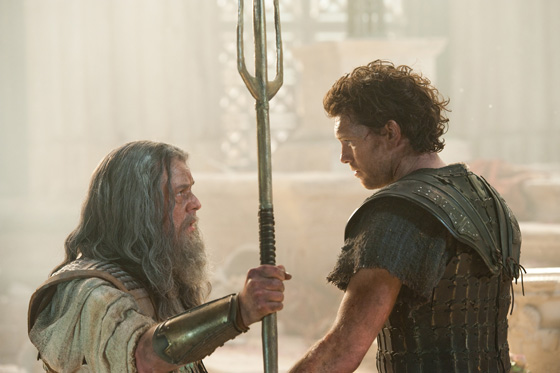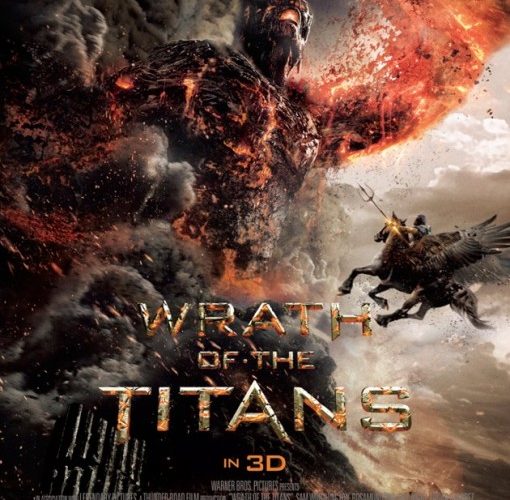There’s nothing like a little patricide to bring two estranged brothers like Zeus (Liam Neeson) and Hades (Ralph Fiennes) together again. It’s what teamed them up to imprison their father Cronus long ago in the underworld prison Tartarus and it’s what will ultimately make them choose sides again while humanity looks on helplessly for a victor. And while Perseus (Sam Worthington) wouldn’t have minded killing his own God of a father in Clash of the Titans, it is his half-brother Ares (Édgar Ramírez) who is ready to usurp familial bonds this time around with the thought Zeus already chose the Demigod as favorite. And thus Wrath of the Titans begins as a sequel nobody actually wanted, but surprisingly is much better than its predecessor.
Still not good enough to warrant the third installment currently in pre-production, the screenwriters had the latitude to create something fresh and new without needing the monsters that nostalgia deemed necessary from the first. Instead, director Jonathan Liebesman is able to instill the ‘on the frontline’ shaky-cam approach he took with Battle: Los Angeles, putting us side-by-side with Perseus as fire and brimstone rains down. A promise to his now dead wife Io—Gemma Arterton had a conflict from returning—to raise their son Helius (John Bell) as a fisherman without the sword causes the son of Zeus to refuse his father’s plea for help against a coming apocalypse and watch as a new war from Hades begins.

Uncle and nephew form an allegiance against the God of Thunder to transfer his power into the destroyer Cronus. Hades’ betrayal is unsurprising considering the lack of love between the two, still sore from banishment to the Underworld; and Ares’ anger at playing second fiddle to a half-human is just the sort of vanity needed to turn him power-hungry and compliant. With humanity’s lack of faith reaching its apex and making the Gods almost mortal, there’s never been a better time to annihilate Zeus’ little pets. Scheming to keep their immortality in return for Cronus’ freedom, Hades and Ares unleash their monsters and prepare for a return to the throne of the Titan leader. But while sons want fathers dead on the dark side, Perseus will stop at nothing to keep the world safe for Helius.
Wrath‘s journey is welcomingly much more cohesive than Clash‘s. Yes, there is a never-ending parade of monsters like a spinning beast with two bodies from the torso up, but they don’t arrive at random to do nothing except pad runtime. Cerberus becomes Perseus’ wake-up call with cool lighter fluid drool, Cyclopes protect the hidden island of Kale, and the rest engage in all-out war against a Greek army led by a now blonde Queen Andromeda (Rosamund Pike). They all infer upon the story rather than intrude and while the fights are exciting and brutal like the first, we’re still invested in our hero’s quest to re-form the Spear of Triam and defeat Cronus. That is the goal and watching Ares kick the crap out of Perseus more than once almost makes us think failure is possible—like they’d ever be that bold.
The computer effects are light years better than two years ago and the 3D miraculously isn’t a distraction—although the simple fact it’s there could be construed as one. Monsters and humans are integrated nicely and no one is saved from a dirty, sweaty, bloody result. Even the climactic battle finds the Greeks wrapping themselves in muddy cloth, keeping authenticity as high as can be allowed in a mythological tale of fantasy. Throw in a pretty cool looking Cronus—despite being the slowest baddie in the world, at least he gets some action unlike the Kraken—with a gorgeous sequence inside the Tartarus labyrinth and the art direction scores a win. And who knew all mazes had a Minotaur? It’s either that or the filmmakers stole him from Theseus because they could.

But while the graphics help increase interest, it’s actually the acting—yes, the acting—that vaults this one over the original. Worthington broods as usual and Ramírez lacks character development to be more than a one-dimensional brute, but at least Fiennes and Neeson are able to show what they can do. Sibling rivalry is high between them, but a spark of compassion allows some emotion to seep into the cardboard anger as their magical powers emanate forth without their respective pitchfork and lightning bolt to help. By letting Ares be the cold-hearted killer, Hades and Zeus find the room to add nuance inside the gaudy stone cliffs and liquid magma of Hell. Sorry, the outlandish sets can often be tough to render believable whether Oscar nominees are populating them or not.
The real winners, however—and why you should rent the film after the hoards make it the number one movie in America—are Toby Kebbell as Agenor and Bill Nighy as Hephaestus. If Clash of the Titans was missing anything besides a good plot, realistic creatures, and entertainment beyond a couple action sequences, it was humor. With Kebbell’s sarcasm and ego, even Worthington is caught cracking a smile here and there. Add in Nighy’s brilliant ability to portray eccentric genius with his trademark odd noises and volume changes and enjoyment will be had. I would have thought the sheer camp of the original Clash would have made the remake poke fun at itself, but it took the internet reappropriation of “Release the Kraken” to show Warner Bros. the error of their way. Hearing Nighy utter the phrase with indifference proves Hollywood studios may have senses of humor after all.
Wrath of the Titans is now in wide release.

